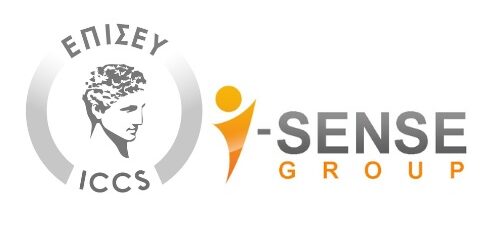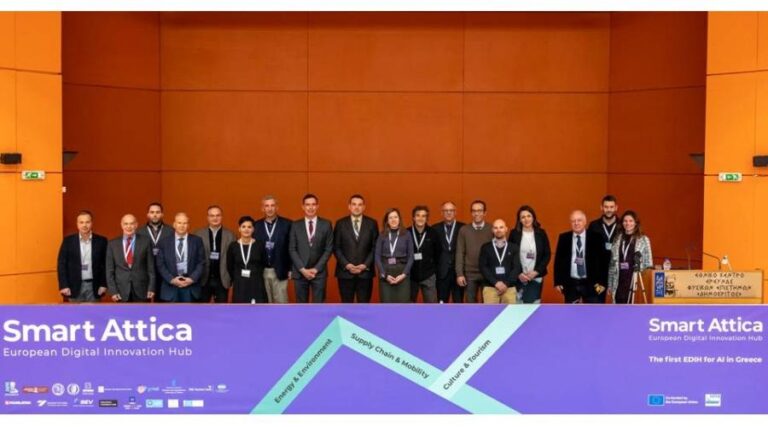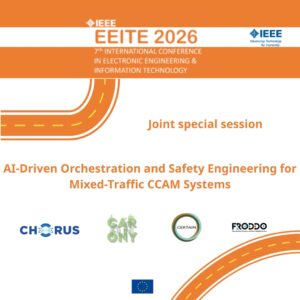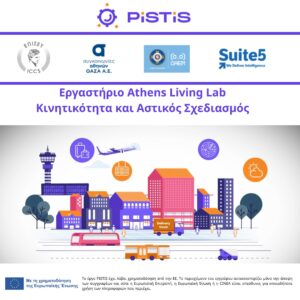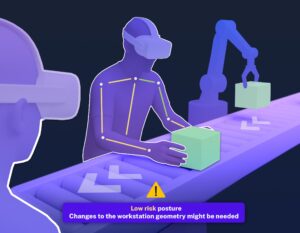The European Digital Innovation Hub Smart Attica for Artificial Intelligence in Greece, a project in which ΙCCS and our team ISENSE-Group is participating and which is being coordinated by the National Centre for Research and Natural Sciences ‘Demokritos’, has been launched. The aim of the hub is the digital transformation of Attica in the first phase and of the rest of Greece thereafter, with emphasis on Energy and the Environment, Supply Chain and Mobility, Culture and Tourism.
Smart Attica, in line with the pan-European network of European Digital Innovation Hubs, aims to support SMEs and public sector bodies in their digital transformation, providing services based on the hub’s expertise in Artificial Intelligence, Big Data, High Performance Computing applications, 5G technology and Cybersecurity.
The inaugural event of Smart Attica took place on Tuesday, January 31, 2023, at the premises of NCSR ‘Demokritos’ and was attended by the Deputy Minister of Research & Technology Mr. Christos Dimas, the General Secretariat of Digital Governance and Simplification of Procedures Mr. Leonidas Christopoulos, the Regional Governor of Attica Mr. George Patoulis and the Deputy Mayor of Digital Transition and Education of the Municipality of Athens Mr. Nikolaos Vafiadis, underlining the importance for the country of accelerating the digital transformation of businesses, the state and society, with a direct impact on the quality of life of citizens and the competitiveness of the Greek economy.
The event was attended by EKT personnel which included Dr Nikos Karampekios, Head of Innovation and Networking Unit, Angelos Angelidis, Coordinator of Enterprise Europe Network-Hellas and National Contact Point for Cluster 4 in Horizon Europe, and George Megas, main National Contact Point for Horizon Europe and EIT Health Coordinator.
The Smart Attica EDIH (European Digital Innovation Hub for Artificial Intelligence in Greece) project aims to support digital transformation and disseminate the latest developments in the fields of Artificial Intelligence (AI), High Performance Computing (HPC) and Cybersecurity to both small and medium-sized enterprises and public administration.
The Smart Attica hub focuses on three critical business sectors of the Greek economy in the Region of Attica and throughout the country: Energy and the Environment, Supply Chain and Mobility, Culture and Tourism.
It aims to enhance the digital maturity of small and medium-sized enterprises and the public sector and will offer four types of innovation services in the following categories:
- test before invest,
- innovation ecosystem and networking opportunities,
- skills and training,
- support to find investment.
The Hub will cooperate with large companies and institutions of the country as well as with corresponding European digital innovation hubs. The launch event was also attended by the Associate partners of the hub, i.e. representatives of businesses and institutions with whom the project has concluded a memorandum of cooperation, including (in alphabetical order): AI Catalyst, Upgrade, Archive, cognitiv+, 8bells, EYZHN, FEAC Engineering, Future Intelligence, Fuelics, Hewlett Packard Enterprise, Linked Business, m-hospitality, Motor Oil, Nomiki Vivliothiki, PlanBe, SciFY, SEKEE and Vodafone. The networking of these representatives laid the foundations for the beginning of cooperation between hub partners and collaborating bodies.
The Smart Attica consortium consists of 17 partners in Greece and is coordinated by the Digital Innovation Hub (ahedd) of the National Centre for Scientific Research ‘Demokritos’. The know-how and roles of the partners, coming from the research, academic, business and banking/ financial sectors, guarantee the empowerment of organisations, offering a full range of services.
The Smart Attica EDIH partners are: the National Centre for Scientific Research ‘Demokritos’, the National Bank of Greece, Found.ation, the Research Centre ‘Athena’, the Athens University of Economics and Business, the Research University Institute of Communication & Computer Systems of the National Technical University of Athens, the Association of Enterprises and Industries, the National and Kapodistrian University of Athens, the National Network of Infrastructures for Technology and Research , the National Technical University of Athens, the National Documentation Centre, the Growth Fund, the Onassis Foundation, the Hellenic Chamber of Hotels, the Athens Development and Tourism Promotion Company, the Regional Development Fund of Attica and Uni. Fund Venture Capital Management Company.
The participation of Greece in the Network of European Digital Innovation Hubs
The European Commission, under the Digital Europe 2021-2027 programme, supported the development of a Network of European Digital Innovation Hubs (EDIHs) to strengthen the European Union’s capabilities in the areas of High Performance Computing (HPC), Artificial Intelligence (AI), Cybersecurity), the development of advanced digital skills and the digital transformation of public administration and interoperability.
European Digital Innovation Hubs are consortia of organisations with complementary specialisations that aim to support businesses, especially small and medium-sized enterprises, but also the public sector in their digital transformation. Providing access to technical expertise and experimentation, as well as the chance to ‘test before invest’, they support companies to improve their business/production processes, products or services using digital technologies. They will also provide innovation services such as financial advice, training and skills development needed for a successful digital transformation.
Greece will participate in the Network of European Digital Innovation Hubs with a total of seven hubs, four of which will be funded by the European Commission through the ‘Digital Europe 2021-2027’ programme, with a total amount of 9.3 million euros for three years, while three more Nodes will participate in the Network without European funding, as they have received the EU seal of excellence. The Greek Nodes of the Network will be active in technological sectors such as: Artificial Intelligence, Cybersecurity, Internet of Things, 5G, big data analysis, blockchain, etc. in combination with policy areas such as health, rural development, e-government, etc.
